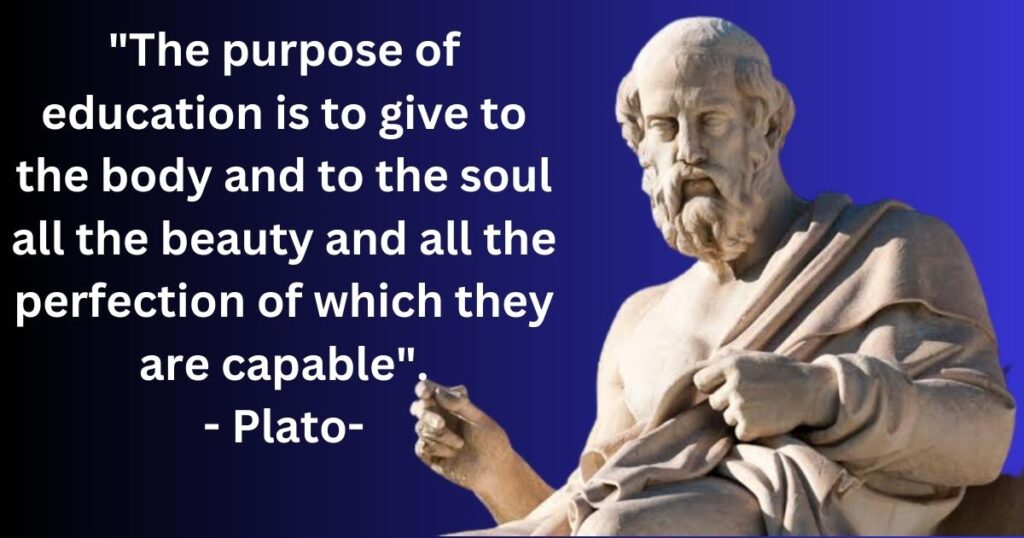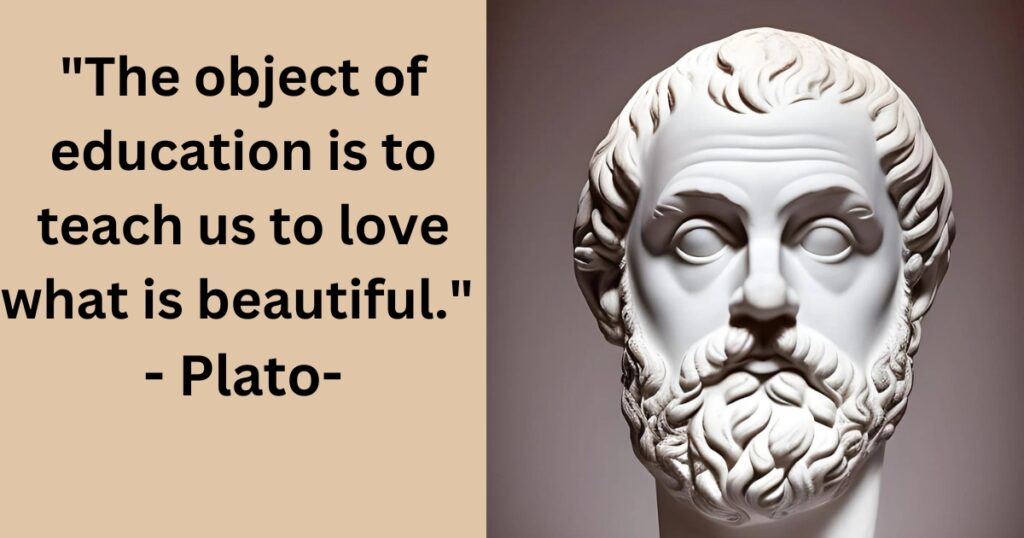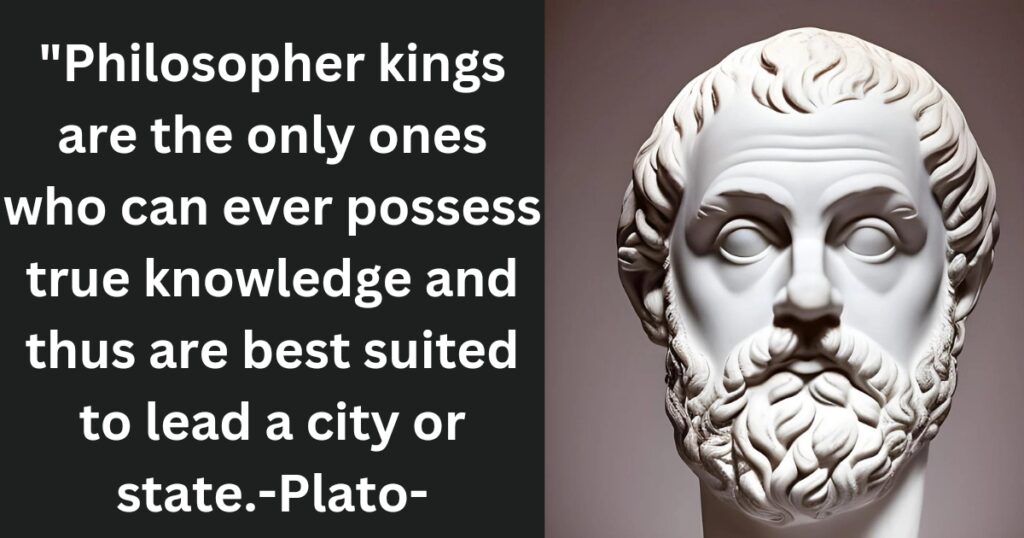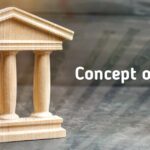Welcome to our guide to Plato’s Theory of Education! As modern learners, we can greatly benefit from understanding the educational philosophy of one of the greatest thinkers in human history. Plato’s ideas about education have influenced the field of philosophy for centuries, and his legacy continues to shape our understanding of learning and personal development.
Plato’s Theory of Education is rooted in his broader philosophy, which emphasizes the pursuit of knowledge, wisdom, and virtue. In this guide, we will explore the key principles and objectives of Plato’s educational philosophy, and delve deeper into his ideas about the ideal education system, the role of moral education, and the individual’s place in the learning process.
Through this guide, we hope to provide you with a comprehensive understanding of Plato’s Theory of Education and its relevance in modern times. So, let’s get started on this fascinating journey!

Key Takeaways
- Plato’s Theory of Education is a foundational part of his broader philosophical framework.
- His educational philosophy is based on the pursuit of knowledge, wisdom, and virtue.
- We will explore the key principles and objectives of Plato’s Theory of Education throughout this guide.
Understanding Plato’s Philosophy
Now that we have introduced Plato’s theory of education, let’s dive deeper into his overall philosophy and how it relates to his ideas about education.
At the heart of Plato’s philosophy is the belief that there is a transcendent world of Forms or Ideas, which exist beyond the physical realm that we can see and touch. These Forms, according to Plato, represent the true reality, and the physical world is merely a shadow or reflection of them.
Plato believed that our true selves are immortal souls, which have existed before birth and will continue to exist after death. In his view, the purpose of life is to seek knowledge of these Forms, which can only be done through philosophy and the cultivation of wisdom.
So how does this tie into Plato’s ideal education system?
Plato believed that education should be centered around the pursuit of knowledge and the development of wisdom. He saw education as a means of guiding individuals towards a deeper understanding of the world and themselves. In his opinion, this type of education would enable individuals to fulfill their true potential and contribute to society in meaningful ways.
Plato’s educational philosophy is based on the idea that there are two types of education: theoretical and practical. Theoretical education involves the study of universal principles and knowledge, while practical education focuses on skills and application.
Plato believed that theoretical education should come first, as it lays the foundation for a deeper understanding of the world. Practical education should follow, allowing individuals to apply their theoretical knowledge in meaningful ways.
In summary, Plato’s philosophy emphasizes the pursuit of knowledge and wisdom as the ultimate goal of life, and he believed that education should be designed to support this pursuit. His ideas about the ideal education system were informed by this broader philosophical perspective, and he saw education as a means of cultivating virtues and moral character in individuals.

The Concept of Moral Education in Plato’s Theory
In Plato’s theory of education, moral education is central. Plato believed that education should go beyond just the acquisition of knowledge and skills. Instead, he viewed education as a means of cultivating virtues and moral character in individuals.
According to Plato, moral education should begin at an early age, as children are highly impressionable and can be easily molded. He believed that individuals should be taught to be just, wise, courageous, and moderate, the cardinal virtues in his philosophy. Moral education is a crucial component of Plato’s overall philosophy, which emphasizes the importance of personal and societal harmony.
“The object of education is to teach us to love what is beautiful.” – Plato
Plato believed that moral education should be intertwined with theoretical education. Theoretical education is the acquisition of knowledge and skills, while moral education is the cultivation of virtue and moral character. Plato believed that the two should not be taught separately, but combined. For Plato, only an education that incorporates both theoretical and moral elements could create well-rounded individuals who will contribute positively to society.
Plato believed that the ultimate goal of education was the development of the philosopher-king, an individual who has attained the highest level of knowledge and wisdom and is, therefore, best suited to govern society. The philosopher-king is the embodiment of Plato’s ideal education system, where knowledge, wisdom, and moral character are emphasized in equal measure.

In summary, moral education is an essential aspect of Plato’s educational philosophy. He saw education as a means of cultivating not only knowledge and skills but also virtue and moral character. For Plato, only a holistic education that combines theoretical and moral elements could create individuals who will contribute positively to society.
The Role of Education in Plato’s Republic
Plato’s most famous work, “The Republic,” offers a comprehensive vision of an ideal society, with education playing a critical role in its realization. According to Plato, the state should take responsibility for educating its citizens to ensure that they become virtuous and enlightened individuals who can contribute to the greater good of the society.
Plato believed that the purpose of education was not just to impart knowledge and skills but also to instill moral values in individuals. He argued that the education system should be designed to foster the development of virtues such as courage, wisdom, justice, and moderation. In “The Republic,” he proposed a specific curriculum that would enable individuals to achieve moral perfection over time.
| Theory | Methodology |
|---|---|
| Theoretical Education | Education should begin with theoretical subjects such as mathematics, philosophy, and science that help individuals understand the world around them. |
| Moral Education | Plato believed that education should be a holistic process that fosters the development of virtue and moral character in individuals. He emphasized the importance of nurturing the emotional and intellectual sides of human nature. |
| Physical Education | Physical education was an integral part of Plato’s educational philosophy. He believed that a healthy mind could only exist in a healthy body, and thus, physical fitness was a necessary condition for a well-rounded education. |
Plato’s philosophy of education has had a profound impact on the way we think about education in modern times. His emphasis on the moral and intellectual development of individuals has informed many contemporary educational theories and methodologies.

However, implementing Plato’s educational ideals in contemporary learning environments can be challenging. Today’s educational systems are often geared towards standardized testing and measurable outcomes, which can conflict with Plato’s holistic approach to education. Nevertheless, we can still draw inspiration from Plato’s philosophy and strive to create learning environments that prioritize character development alongside academic achievement.
Plato’s Educational Ideals and the Individual
Plato’s theory of education has always emphasized the critical role of education in individual development. According to him, the objective of education is to cultivate the intellectual and moral virtues of an individual to help them lead a fulfilling life.
“Education is the kindling of a flame, not the filling of a vessel.” – Socrates
Plato believed that education should be a holistic process that takes into account the intellectual, emotional, and moral development of a person. He believed that the primary goal of education was not just to transmit knowledge but also to instill a sense of morality and virtue in individuals.
Plato believed that individuals should be educated in both the theoretical and practical aspects of life. Theoretical education includes the study of mathematics, science, and philosophy, while practical education includes training in skills necessary for daily life, such as carpentry, weaving, and agriculture. Plato believed that theoretical education was necessary for developing rationality, while practical education was necessary for developing practical skills.
Furthermore, Plato believed that education should be a lifelong process. He believed that learning should not stop after leaving formal education but should continue throughout life.

“Education is the most powerful weapon which you can use to change the world.” – Nelson Mandela
Plato’s emphasis on human development and lifelong learning continues to resonate in modern educational systems. His holistic approach to education and its emphasis on character development has been influential in shaping contemporary educational theories and methodologies such as Montessori and Waldorf education.
Indeed, modern educational systems are beginning to recognize that education should not just focus on academic achievement but also aim to develop the whole person, just as Plato advocated centuries ago.
Classical Education and the Legacy of Plato

As one of the most influential philosophers of all time, Plato had a profound impact on education in classical Greece. His ideas about education were so influential that they shaped educational practices in Athens for centuries to come.
Plato believed that education was a vital component of creating an ideal society. His belief system revolved around promoting intellectual and moral development in individuals, which would ultimately lead to the creation of a just and harmonious society.
During Plato’s time, education was not widely available to everyone. It was primarily offered to those who could afford it, and it took place outside of the traditional schooling system. Plato, however, believed in making education accessible to all individuals, regardless of socio-economic status.
In his seminal work “The Republic,” Plato proposed an educational system that would be available to all individuals, regardless of social standing. This educational system was designed to promote the development of virtues such as wisdom, courage, and justice in students.
| Key Elements of Plato’s Educational System in The Republic: |
|---|
| The division of students into groups based on their natural abilities and aptitudes. |
| The use of music and poetry to aid in the development of moral character. |
| The study of mathematics and the sciences to cultivate intellectual growth. |
Plato’s ideas about education were influential not only in Athens but also throughout the ancient world. His emphasis on the holistic development of individuals and the cultivation of virtues such as wisdom and justice continues to influence educational practices today.
Classical education, which emphasizes the study of the humanities, including literature, history, and philosophy, was heavily influenced by Plato’s educational philosophy. It was based on the belief that education should strive to produce well-rounded individuals who are capable of critical thinking, moral reasoning, and effective communication.
Plato’s educational legacy continues to shape education in the modern era. His ideas about the importance of intellectual and moral development, accessible education, and the cultivation of virtues remain relevant and applicable to educational practices today.
The Relevance of Plato’s Theory of Education Today
Plato’s educational philosophy has endured for over two thousand years, and its principles continue to resonate with modern educators. In a world where education is increasingly focused on standardized testing and rote memorization, Plato’s holistic approach provides a refreshing alternative.
Plato believed that education should be a transformative experience, fostering the development of the whole person rather than simply transmitting knowledge and skills. He argued that education should be a lifelong pursuit, with individuals continuously striving to deepen their understanding of themselves, their communities, and the world around them.
In today’s rapidly changing society, many educators are recognizing the importance of cultivating critical thinking, creativity, and adaptability in their students. These are precisely the qualities that Plato championed in his theory of education.
Plato’s ideas about the importance of moral education, the role of the individual in society, and the connection between knowledge and virtue are all highly relevant to the challenges facing modern learners.
As we strive to develop a more just and equitable society, Plato’s vision of education as a means of promoting social and moral development remains as important as ever. By embracing the principles of Plato’s educational philosophy, we can create a more meaningful and transformative learning experience for ourselves and future generations of learners.
Implementing Plato’s Theory of Education: Practical Considerations
Now that we have a clearer understanding of Plato’s educational philosophy and its significance, it’s time to explore how we can apply his ideas in modern learning environments. Here are some practical considerations:
- Focus on moral education: As we discussed earlier, Plato believed that education should be a holistic process that fosters the development of virtues and moral character in individuals. Therefore, educators should prioritize the cultivation of ethical values and character development in their teaching practices.
- Emphasize theoretical and practical education: In Plato’s ideal education system, there is a balance between theoretical and practical education. Therefore, educators should aim to strike a similar balance in their teaching practices. This could involve incorporating hands-on learning experiences and real-world applications of theoretical knowledge.
- Encourage critical thinking: Plato believed that education should focus on developing critical thinking skills. Therefore, educators should create opportunities for students to analyze, question, and evaluate information and ideas.
- Develop individualized learning plans: Plato’s educational philosophy emphasizes the importance of individual development. Therefore, educators should aim to create individualized learning plans that cater to each student’s unique needs, strengths, and interests.
- Integrate technology: While Plato’s theory of education predates the existence of modern technology, educators can still incorporate technology into their teaching practices to enhance the learning experience. This could involve using interactive tools and platforms to engage students and facilitate learning.
By incorporating these practical considerations, we can begin to implement Plato’s theory of education in modern learning environments and offer a more well-rounded and effective educational experience for students.

Conclusion
In conclusion, we have explored the significant impact of Plato’s Theory of Education on the fields of philosophy and education. His belief in the importance of holistic education, moral character development, and individual growth continues to resonate with modern educational theories and methodologies.
Plato’s philosophy and educational ideals have left an indelible mark on the history of education, particularly in the classical education of ancient Greece. His vision of an ideal education system in “The Republic” continues to inspire and inform contemporary educational development.
Implementing Plato’s theory of education in modern times may require adapting his ideas to suit the specific needs of learners and educators. However, by incorporating his principles and methodologies, we can elevate the educational experience and foster the development of virtuous and knowledgeable individuals.
FAQ
Q: What is Plato’s Theory of Education?
A: Plato’s Theory of Education is a philosophical framework that emphasizes the importance of education in shaping individuals and society. According to Plato, education should focus on cultivating virtue, promoting intellectual development, and nurturing the moral character of individuals.
Q: What are the key principles of Plato’s Theory of Education?
A: The key principles of Plato’s Theory of Education include the belief in the importance of moral education, the emphasis on intellectual development through the pursuit of knowledge and wisdom, and the idea that education should be a holistic process that nurtures the whole person.
Q: How does Plato’s Theory of Education connect to his overall philosophy?
A: Plato’s Theory of Education is closely connected to his broader philosophical beliefs. Plato believed that education was a means to achieve an ideal society, and he saw education as a tool to shape individuals into virtuous and enlightened citizens who would contribute positively to the greater good.
Q: How does Plato’s Theory of Education impact modern education?
A: Plato’s Theory of Education continues to have relevance in modern times as it highlights the importance of holistic education, the cultivation of virtues, and the pursuit of knowledge. Many educational theories and methodologies today draw inspiration from Plato’s ideas to create effective learning environments.
Q: What is the significance of Plato’s Theory of Education in ancient Greece?
A: Plato’s Theory of Education played a vital role in shaping educational practices in ancient Greece. His ideas influenced Athenian education and laid the foundation for the concept of classical education, which emphasized the development of well-rounded individuals with a strong moral character.
Q: How can educators and learners incorporate Plato’s Theory of Education?
A: Educators and learners can incorporate Plato’s Theory of Education by fostering a holistic approach to education, emphasizing the importance of moral development, and promoting the pursuit of knowledge and wisdom. Practical application can involve creating engaging learning environments and encouraging critical thinking.
Q: Is Plato’s Theory of Education still relevant today?
A: Yes, Plato’s Theory of Education remains relevant today as it addresses timeless principles such as the importance of moral education, intellectual development, and the holistic growth of individuals. His ideas continue to inform modern educational theories and methodologies.
You also read Plato’s Ideal State: The 4 Powerful Pillars.










